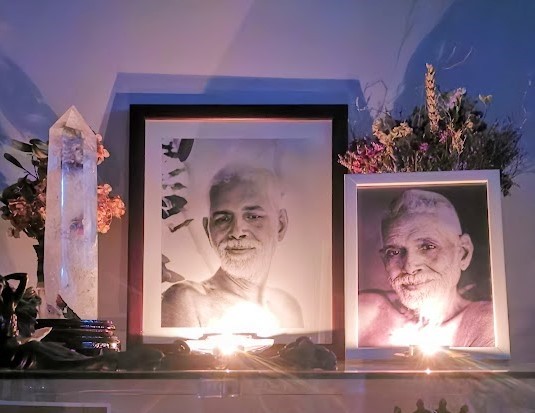#actions without personal desire nish-kamya karmas
Photo

🔱 Om Namo Bhagavathe Sri ArunachalaRamanaya 🔱
🕉️
The Paramount Importance of Self Attention, by Sri Sadhu Om, As recorded by Michael James
Part Six - Mountain Path: July – August 2013 - Excerpt
Note of 7th January 1978 (Part 1)
🕉️
Sadhu Om: When waves of passion such as desire, lust or fear arise, either try to duck beneath them by self-attention, or else reflect on their uselessness and avoid them by viveka [discrimination] and vairāgya [dispassion]. If the waves continue to come more strongly and none of these methods help, pray to Bhagavan. Prayer coming from an agonised heart has its own power. Whenever we feel helpless, prayer is our best weapon. He is always ready to help the helpless if their prayer is sincere.
Meritorious actions (punya karmas) done with kamyata (desire for personal benefit) do not purify the mind. Actions done without such desire (nish-kamya karmas) purify the mind, but they are the least efficacious means.
Unless worship and prayer are done with an attitude of ego-abasement, they will not purify the mind. Worshipping with pride only feeds the ego. Better than worship is sravana [hearing or studying the guru's teachings] and manana [reflection on them]. Reading about the lives of saints and reflecting on their behaviour and teachings will help us to subside our ego. Better than that is satsanga: in the company of real sadhus [jñānis], we cannot but act with humility. Satsanga [association with sat, truth] purifies the mind in many ways, but the best satsanga is to remain quietly as 'I am'. As Sankara says in Vivekacudamani [verse 364], a hundred times better than sravana is manana, but one lakh [a hundred thousand] times better than manana is nididhyasana [contemplation], which is just remaining attentively as 'I am'.
The reality of whatever is seen is the same as that of what sees it. The God you see is only as real as you who see him. If you worship God in a name and form, your mind will be purified, and when it is sufficiently purified, he will appear as guru to teach you the practice of self-attention. The guru is not just to be worshiped — he is to be obeyed. In verse 274 of Guru Vachaka Kovai Bhagavan says:
Those who do not have [the clarity of] mind to recognise that the jñāna-guru — who appears as a human form [though he is actually] abiding firmly as the supreme space [of consciousness, 'I am'] — is formless, [thereby] bear the yoke of wicked conduct and sin.
This is not to say that guru-bhakti [devotion to the guru] is wrong, but that our devotion is not true guru-bhakti unless we also practise what he taught us. Though the outward form of the guru and his teachings are a projection of our own vāsanās (tendencies), they will nevertheless wake us up, like a lion that an elephant sees in its dream. Self-attention is the most effective means of purifying the mind. The more you try to attend to self and the more you thereby experience the happiness of self-abidance, the more clearly you will understand and be firmly convinced that all happiness comes only from self, and that rising as 'I' is misery. Thus your vairāgya (desirelessness) will increase and your attachments to things will become less.
Whenever you have some moments free, reflect: 'What is this ego-life? Now I take this body to be 'I' and this world to be real. I feel attachment to things, people and circumstances, but I have only experienced this life for a certain number of years, and some years from now I will cease experiencing it forever. Therefore why should I take interest in or be ambitious for this transient and futile life? All these things seem to exist only because I exist, so should I not try to find out the truth behind this 'I'?' The more you reflect in such a way, the more you will lose interest in your life and the more you will wish to remain just as 'I am'.
When people used to say to me, 'You are lucky because you were with Bhagavan', I would sometimes find some ego rising in me with pride. However, by Bhagavan's grace I thought of a good reply: 'In a hospital there is an outpatient department to treat minor cases, but the worst cases are admitted into the inpatient department to be treated under the personal supervision of the doctor. The same happens in this spiritual line, so I am such a helpless case that Bhagavan had to admit me into his inpatient department to treat me under his personal supervision'. Those who were not in Bhagavan's physical presence are lucky, because they are protected from the delusion of mistaking him to be his body.
🔱 🔱 🔱 🔱 🔱 🔱
#Bhagavan Sri Ramana Maharshi#Sadhu Om#Michael James#the paramount importance of self-attention#viveka discrimination#vairagya dispassion#desirelessness#passion#desire lust fear#prayer#meritorious actions punya karmas#kamyata desire for personal benefit#actions without personal desire nish-kamya karmas#sravana - manana - niddhyasana#learning assimilation practice#guru-bhakti#devotion to the guru#vasanas tendencies
16 notes
·
View notes